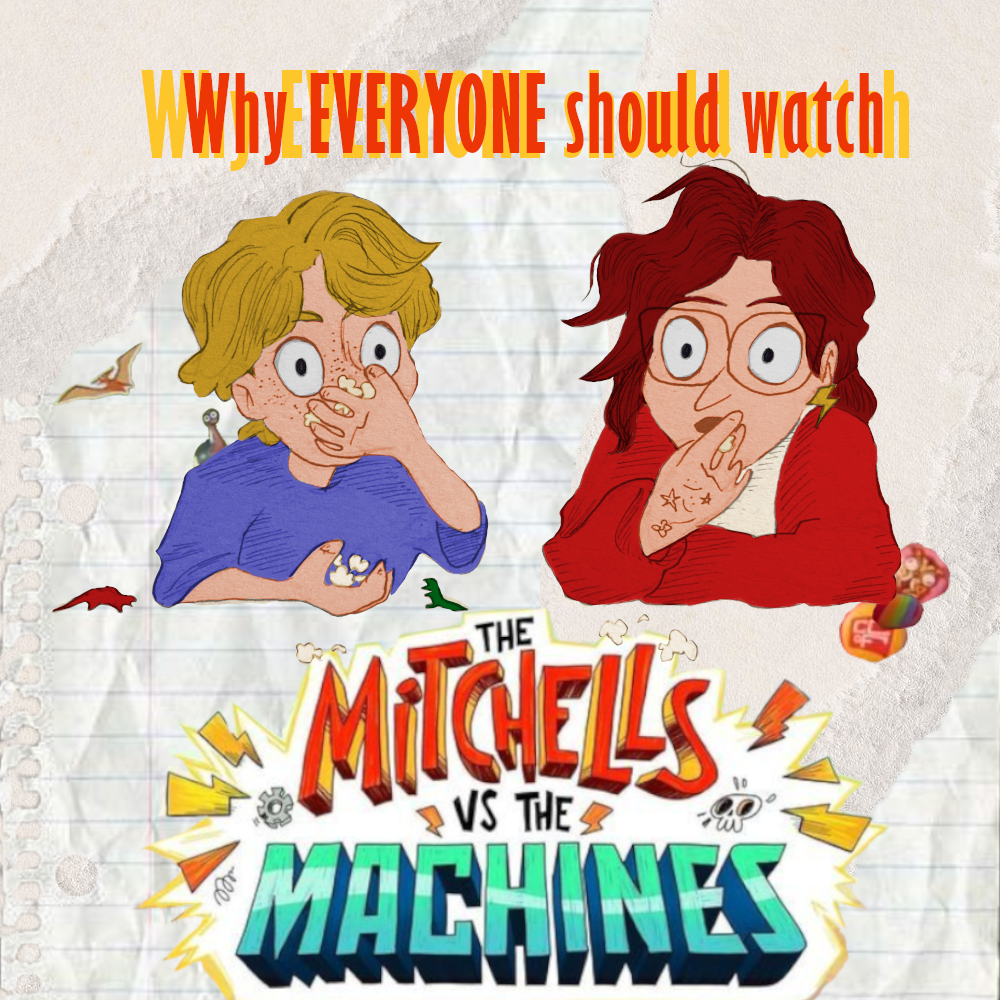Please visit response.fsu.edu for official FSU updates and resources.
Why Everyone Should Watch The Mitchells vs. The Machines at Least Once

When I first watched The Mitchells vs. The Machines on Netflix, it instantly became one of my favorites. The animation style is fun and chaotic, but the movie carries a meaningful plot with a complex family dynamic between the characters. But asides from these, what makes this movie meaningful to me, and many other queer individuals, is Katie’s character. The movie starts as Katie is about to go to film school in California, so she’s presumably around 18 years old or so. When her dad cancels her plane ticket and the family takes a road trip to bring her to California, it goes awry when the Pal Robots go AWOL and capture all of humanity. (Except the Mitchells, of course).
Mitchells vs. The Machines is one of my favorite examples of queer rep because of how Katie’s identity is not the focus of the film but rather an ingrained aspect of the plot that makes it relatable for a wide audience. Katie’s sexuality, instead of being the driving force behind the plot, is a part of her character in the story. Mitchells vs. The Machines normalizes the queer experience. While not officially revealed until the end of the film, when the audience learns that Katie has started dating one of her friends Jade after she goes to college, it is a rather obvious motif within the plot. Interlayed with the story throughout the film there are not-so-subtle references to Katie’s sexuality as a queer individual.
At the beginning of the movie, we get a flashback to Katie’s life before it catches up to present-day events. In this montage, Katie says that “[her] parents haven’t figured [her] out,” and that it “took [her] awhile to figure [herself] out.” This is an experience that many queer people face, especially with coming to terms with their identity and finding their place within the LGBTQ+ community. While I don’t speak on behalf of the entire LGBTQ+ community, many queer people share similar experiences on coming to terms with their identity, no matter how they identify. This can be especially true when growing up feeling stigmatized or bullied because of your identity, which is why queer representation like Katie in Mitchells vs. The Machines is important for normalizing the existence of people in the LGBTQ+ community.
Katie’s identity is also something that deepens her relationship with her little brother Aaron. The two have a close relationship, as the two understand each other better than their parents do. Aaron is around eight years old and has neurodivergent tendencies such as his obsession with dinosaurs, similar to hyperfixations or special interests that neurodivergent individuals have. Katie and Aaron can relate to one another because of their unique experiences and how they may be treated differently because of their identities. Near the end of the movie, Katie sees a drawing that Aaron created of their neighbor Abby. Aaron has a crush on Abby in the movie, who is also obsessed with dinosaurs, the two share the same special common interest. Katie tells Aaron, “Don’t hide your feelings, man. That’s no way to live.” Coming from the viewpoint of a queer person, this quote is an experience that many people in the LGBTQ+ may face. Some queer individuals may have to hide their feelings or their identity because it may not be safe for them to come out, or may feel insecure about coming out or unsure of their identities, or may hide their feelings for other reasons.
When going to college, one of the things Katie is most looking forward to is meeting other like-minded people. In college, people are freer to express themselves, and it’s easier to meet people you can relate to through student organizations and other groups. Queer individuals and even those not in the LGBTQ+ community tend to befriend others easier and feel more comfortable around people they can relate to, especially when they have shared experiences and identities.
Katie’s personality, how she dresses, and her relationships with other people are very reminiscent of common traits of people in the LGBTQ+ community. Katie’s overall “quirkiness,” how she stands out, and how she feels misunderstood by her parents are shared experiences between queer people. Katie also wears a rainbow pride pin, which is also another signal of her identity as a queer individual.
Mitchells vs. The Machines is a film that I hold dear to my heart, especially because of how I relate to Katie’s experiences of being queer and feeling misunderstood or different. I first watched the movie on its original release in April 2021, when I was 14 years old and in ninth grade. Katie was a character that I could relate to, and seeing myself represented in such a fun movie helped me to understand myself better. Katie’s identity, and how it affects her character and how she interacts with her family, was something that hit home, especially in relation to how I relate to my identity and my relationships with other people. Now, rewatching the film in college, I can relate to Katie on a deeper level. Like Katie, going to college helped me to discover who I am, and I feel freer now to express myself fully and more confidently. While I didn’t grow up with the film, watching it again after growing up and going to college put Katie’s character into a new perspective, especially because of how relatable the movie is and how big of a step it was for queer representation. Mitchells vs. The Machines is a film that everyone should watch, and in the future, I hope more films use it as a springboard to increase queer representation in mainstream media like films and tv.
Writer: Addison Delgado
Artist: Brooke Barnes



